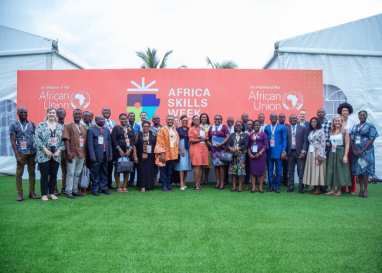
Private sector engagement is vital to strengthening TVET (Technical and Vocational Education and Training) in Africa, enabling students to gain industry-relevant skills for today’s job market. In Ghana, where youth unemployment and skills mismatches are pressing issues, partnerships between education and industry offer practical pathways to employment by providing hands-on training, mentorship, and exposure to emerging technologies. Recognizing this need, the Pact for Skills: Support to the Transformation of the TVET System in Ghana project hosted a roundtable on Private Sector Engagement during Africa Skills Week 2024. This session highlighted collaboration strategies to ensure TVET students are job-ready, aligning Ghana’s educational goals with its broader aim of economic growth.
Key Insights from Panelists on Skills Development
- Adapting TVET Curricula to Industry Demands
Dr. Anthony Gewer emphasized that TVET curricula must be continuously updated with industry insights to ensure graduates meet market needs. South Africa’s model, where curricula are regularly revised with input from industry experts, serves as a leading example. - Apprenticeships for Real-World Experience
Mr. Gideon Murenga highlighted Kenya’s apprenticeship model, where industry-supported apprenticeships bridge the gap between classroom learning and practical experience, enhancing employability and preparing students for the workforce. - Incentivizing Industry Participation
Constance Swaniker noted that incentives like tax reductions, duty waivers, and equipment support encourage private-sector involvement. These measures make it easier for companies to invest in TVET partnerships, helping to absorb and train graduates. - Digital Skills as a Foundational Competency
Panelists stressed the need for digital literacy across all TVET programs. According to Mr. Benedict Mensah, digital skills are essential in today’s workplace, from agriculture to manufacturing, providing graduates with adaptability across industries. - Embedding Entrepreneurship for Job Creation
Given Africa’s youth unemployment, entrepreneurship is a viable pathway to employment. By equipping students with entrepreneurial skills, particularly in fields like green energy, TVET can empower them to become job creators, not just job seekers.
Impact and Future Implications
The roundtable underscored the importance of aligning education with industry needs and incentivizing private-sector involvement. Key outcomes include increased employability through skills-matched curricula, enhanced public-private partnerships, and regional collaboration for shared learning. These strategies offer a blueprint for advancing skills development across Africa, building a resilient, skilled workforce that can drive sustainable economic growth across the continent.

